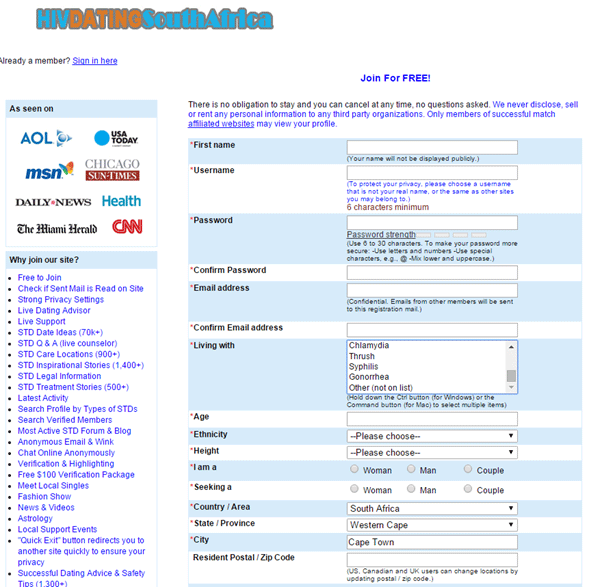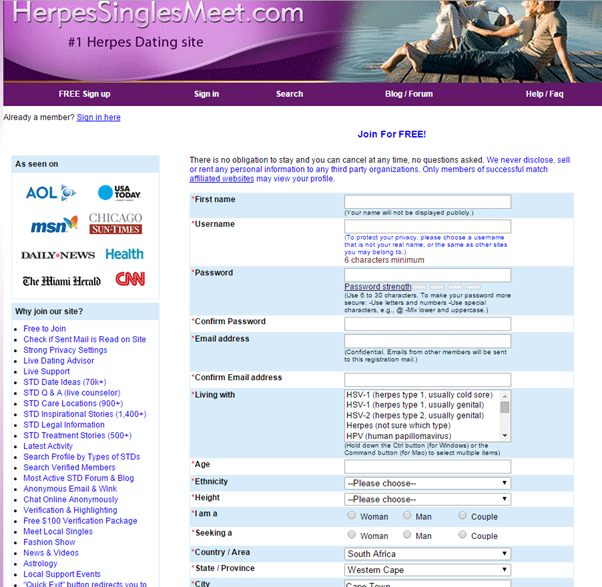
Conduct a simple web search for “STI dating sites” (or more generally known as STD for sexually transmitted disease), and you'll find dozens and dozens of online dating options for people suffering from herpes, hepatitis, syphilis, gonorrhoea, chlamydia and HIV, to name a few.
It sounds like a reasonable idea as people who suffer from these diseases are often reluctant to disclose the infection to a new partner, and if you know your partner already has one too, there is less shame involved in the disclosure and the relationship can get off on a more equal footing.
One such website offering its services to people suffering from herpes, www.hope.dating, even goes as far as calling STD’s “gifts”; “People gifted with STDs are special. Their needs, preferences and tastes are very different too. Hope aims to provide unconditional support and a feature-packed STD dating platform for all these special people.”
Using emotion-laden wording, romantic stock pictures of happy couples and a high number of 'success stories', these STD dating sites draw large numbers of subscribers looking for love.
But is it a safe place to disclose your 'status'?
In 2014 the dating website positivesingles.com was involved in a lawsuit when a user discovered his profile was also shared on other sites like AIDSDate, Herpesinmouth, ChristianSafeHaven and MeetBlackPOZ when he was neither HIV positive, Christian or Black, and this despite the site promising a "confidential" service.
On the positivesingles.com Terms of Service page it states that information about the user’s HIV and STD status might be shared with other sites in the successfulmatch.com group, which is the parent site of all the abovementioned properties. The plaintiff in the case stated that few members would ever click on or read the terms.
Positivesingles now faces having to pay out $16.5m (R202 million) after losing the privacy case. This case highlights a major issue for internet users: just how secure is the information you share on these niche sites?
Not very, as Hope.dating states on its Terms of Service page: "To the fullest extent permitted by local and national laws, you acknowledge and agree to the fact that any material you send to us shall be treated non-confidential and the site has the right to use such material in advertising or promotions."
Dating with an STD made easy
At first glance the websites look no different from any other dating website. Some websites offer a free sign-up service. Most of the sites also offer premium packages with additional functions like services from an STD counsellor, searching according to STD types and chatting with members of the community.
But how does it all work?
If you look at one or more of the niche websites you will notice that most of them look similar. It seems as if Successfulmatch.com provides the technology on which various websites can be built and tailored for specific groups, areas and diseases. Most of the sites appear to be affiliated sites and indeed, Positivesingles has 364 affiliated sites listed on their website.
On further investigation one discovers it's basically the same website with variations based on the site's niche.
Here is an example: HIVDatingSouthAfrica

And a similar one HerpessinglesMeet.com

It is clear from the examples that the signup pages are very similar, with just minor tweaks to fit the target market.
Darren Ravens, Integrated Marketing Manager for 24.com, South Africa's largest digital publisher, says that Successfulmatch.com provides the technology to design and operate a dating website. This technology is then used to create different sites (or "mirrors") using a standard platform.
Shared information
This then begs the question that, if you sign up to one of these services, will your information be shared with other sites?
On the PositiveSingles website it states that “We never disclose, sell or rent any personal information to any third party organisations. Only members of successful match affiliated websites may view your profile.”
Indeed, the affiliated website list includes sites like: positivefishes.com, hivgaymeet.com, celebritieswithstds.com, genitalwartswomen.com and hivdatingsouthafrica.co.za.
By signing up, you essentially give permission that your information can be made available to any of the sites affiliated with PositiveSingles. However, few people ever read the disclaimers and terms and conditions of signing up to a website, which may include clauses allowing the site to share information with other sites.
Matters become more complicated when one compares the content of the privacy policy of Successfulmatch.com (the “owner” of the affiliated sites) to the claims posted on the website itself.
On the PositiveSingles (PS.com) website it states: “Only members of Successful Match (SM.com) affiliated websites may view your profile”, but on the privacy policy it says: “Affiliate websites are landing pages which provide a portal to the PS.com website, which potentially increases the number of individuals with whom you may have a match. Affiliate websites within the SM.com Network have different domain names, but all link to the PS.com website.
Anyone accessing the PS.com website through an Affiliate landing page can only view your profile on the PS.com website if they are Members of PS.com and there is a match to your personal parameters, which you set and control, or you choose to provide them with your profile or personal information. SM.com does not make your PS.com profile viewable or accessible on any Affiliate website.”
These contradictory claims complicate matters.
Are people interested?
No detailed or verified statistics on the number of members on STD dating sites are available. STDmatch.net claims to have over 750,000 members. Herpessinglesmeet.com claims to have 900,000 registered users. This numbers appear to be a reflection of the number of subscribers to the Successfulmatch.com platform rather than each individual website.
The figures are at best misleading. It is estimated that there are approximately 12 million dollar millionaires. The MillionaireMatch site claims there are approximately 2.3 million users on their site. This means that almost 20% of the world’s millionaires are single and looking and registered on their website.
If you do a simple search on the MillionaireMatch website that you are a man looking for a man in KwaZulu-Natal, it shows that there are 300+ profiles that match your search. It is estimated that there are 190 millionaires living in KwaZulu-Natal based on the South Africa 2015 Wealth Report by New World Wealth.
This proofs the inaccuracy of the information provided on these types of sites and that it's only used to get users to sign up.
Is this all about making money?
On the affiliate site partnering page of Successfulmatch.com, the following paragraph summarises the business model:
“Our affiliate programmes pay one of the highest commissions available in the industry. We always design our affiliate sites and banners around the needs of our members. Some of our affiliate partners earn tens of thousands of dollars on a monthly basis.”
It appears that because there is money involved there are strong reasons to create random sites. Signing up for free will give the creator of the site US$2. If a user buys full membership to include all the features of the site, the creator will earn US$40.
Smokescreen or the real deal?
Signing up to a site where supposedly all the users have herpes might turn out not to be the case as highlighted in the court case mentioned earlier. One could essentially argue that signing up to a niche site is nothing more than signing up to a dating website with “niched bannering”.
Judging by the policies and disclaimers of the sites, you are essentially a fish lured into a pond which, on the surface, appears to be a place you can call home, but turns out to be a cesspool full of monsters once you look below the surface.
Tips from an expert
Darren says that with dating sites among the top money-spinners online, myriad niche dating sites have sprung up seemingly overnight. He says that the underlying technology has become exceedingly easy to procure, so anyone with an idea for a dating niche and the knowledge to market it online can get into the dating site game.
"Christian dating, senior dating, divorced dating, STI dating, singles etc. have been sliced and diced into every category imaginable with a dedicated dating site promising the ultimate match-up for people just like you", he says.
Along with it, comes the endless horde of affiliate websites, created solely to funnel hopeful singles toward sites prepared to pay for every lead generated. The upshot of this is an environment fraught with danger for hopeful singles innocently looking to connect with others.
Watch out for:
- If it’s a free site, pay special attention to Ts&Cs and privacy policy to ensure you’re not consenting to have your personal information shared across other websites. (Even more worryingly, some sites have been accused of violating their own privacy policies.) With niche dating sites, user profiles can sometimes be shared across other websites in the portfolio, which might be unwanted. This could essentially mean that your sexual health status, your image and other personal information is laid open for the whole world to see.
- If it’s a paid subscription site, check what the conditions for cancellation are and make sure you’re not getting locked into recurring charges.
- Check to see where the company is based, how you’re going to get billed and what online reviewers have to say about the site.
- If you’re connecting with anyone online, take special care to ensure they who they represent themselves to be. Unscrupulous scammers are known to prey on unsuspecting singles to solicit payment or collect personal information.
- By opting into a STD dating site, users are willingly disclosing an aspect of their personal health status. This can make it a fertile hunting ground for medicine scammers peddling their usually unproven cure-alls. Get your treatment advice from a medical professional you trust, not from an online stranger making unsubstantiated claims.
- Never ever, ever enter your credit card details on a site that doesn't have SSL (secure sockets layer) encryption installel. You'll know if the site has SSL because the URL for the site will start with HTTPS:// (instead of just HTTP://). Also look for the icon of a locked padlock, typically in the status bar at the bottom of your web browser, or right next to the URL in the address bar.
- See if the same information appears in other places or has been copied from someone else by searching for it online.
- Before connecting with someone, use Google Image Search or Google Goggles on your phone to see if their profile picture is published elsewhere on the web.
- And finally, remember that on some dating sites, as many as one out of 10 profiles is a scammer.
Read more:
Apps for gay and bi men tied to STI risk
Dating site blamed for HIV spread
Image: online dating, Shutterstock




 Publications
Publications
 Partners
Partners














